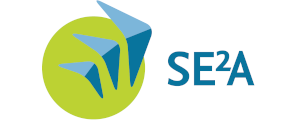
Effective load alleviation enables radical mass reduction of aircraft wing primary structures and, directly and through secondary effects, also a reduction of overall aircraft mass, energy consumption and emissions. Previous research has shown that both active and passive concepts face limitations in alleviating dynamic loads over the entire flight envelope and for all relevant load cases. The project HyCoNoS will substantiate feasibility of hybrid load alleviation concepts combining smart structural design exploiting structural and geometric nonlinearities, and unconventional actuation methods such as fluidic actuation and control surfaces operated in efficient reversed mode. These individual active and passive load alleviation concepts will initially be parametrically investigated in preparation of a combined application. The most promising concept combinations will be selected and optimized for mid- and long-range aircraft configurations and operating conditions covering the full flight envelope. Based on these results, a comprehensive comparison of different hybrid concepts for load alleviation will be carried out, evaluating their load reduction potential, integration and compatibility with other systems, and climate-relevant impact for the entire aircraft.
Wissenschaftliche Mitarbeiter
Evangelos Filippou (TU Delft, Aerospace Structures & Materials)